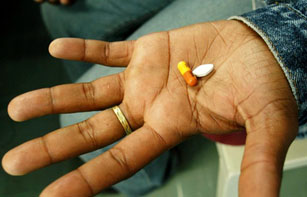
Credit: UNAIDS
UNAIDS has conducted a 15-country survey* to understand the possible impact of the Global Fund to Fight AIDS, Tuberculosis and Malaria’s recent decision to cancel its next funding round (Round 11). The survey looks at the impact of this decision on countries’ ability to scale up access to HIV and tuberculosis programmes. The UNAIDS country offices, who participated in the survey, have expressed serious concerns about the potential disruption of HIV treatment and prevention services starting from 2014. Findings also point towards long-term challenges in meeting the 2015 AIDS targets adopted by world leaders at the UN High Level Meeting on AIDS in June this year.
Half of the respondents said the cancellation of Round 11 and proposed cuts in Phase 2 funding would be “catastrophic” for national AIDS responses.
“Countries may have to reprogramme existing funds and simultaneously identify new sources of funding to sustain and scale up HIV prevention and treatment programmes,” said Tim Martineau, UNAIDS Director of Programme Effectiveness and Country Support. “UNAIDS is working closely with countries and will further scale up its effort to identify the critical gaps and urgent steps needed to sustain national AIDS responses.”
UNAIDS is supporting countries to undertake cost-effectiveness studies to enable the reprogramming of existing funds. UNAIDS is also helping countries to identify bottlenecks, funding and programmatic gaps between 2012 and 2015, and potential cost-saving interventions. Over the next year, UNAIDS will offer guidance to countries in revising their current investments in HIV.
Any delay in funding from the Global Fund could have long-term consequences on the global AIDS response. Countries may to have to reprogramme existing funds and simultaneously identify new sources of funding to sustain and scale up HIV prevention and treatment programmes. UNAIDS is working closely with countries and will further scale up its effort to identify the critical gaps and urgent steps needed to sustain national AIDS responses.
Tim Martineau, UNAIDS Director of Programme Effectiveness and Country Support.
“In Cambodia, major studies are under way and partners are coordinating their efforts to identify where to best build efficiencies and use innovative approaches to maintain the momentum at less cost,” said Tony Lisle, UNAIDS Country Coordinator.
In Zimbabwe, findings from a recent gap analysis showed that there are major problems with commodities and supply. The analysis also showed that the annual need for funding amounts to US$ 300 million; a decline in funding from the Global Fund would mean major setbacks in Zimbabwe’s response to the epidemic.
Many of the respondents reported that while existing resources in the short term can meet the needs of people already on treatment, the momentum to add new people on life saving treatment would diminish. For example, Indonesia has scaled up HIV testing and counselling and has doubled the numbers of people on treatment over the last three years. However the country’s AIDS response is heavily dependent on funding from the Global Fund and a reduction in investments would severely decrease Indonesia’s ability to continue scaling up.
In Ukraine, the government agreed to co-financing the HIV treatment programmes together with Global Fund’s support—a significant step in increasing access. A policy shift to scale up harm reduction programmes implemented in collaboration with non-governmental organizations is now in danger of being derailed as crucial funds from Round 10 have not yet been made available. The HIV epidemic in Ukraine is primarily concentrated among injecting drug users. Just under 50% of the estimated 230,000-369,000 injecting drug users are estimated to be living with HIV.
“Timely funding is critical for Ukraine. There is a lot of positive political momentum and the international community must fulfil its part of the promise,” said Ani Shakarishvili, UNAIDS Country Coordinator in the Ukraine. “If the Global Fund resources do not come in time, harm reduction programmes will be in a crisis mode.”
Three quarters of the countries surveyed were relying on a new injection of funds from the Global Fund to either continue their HIV services or expand them. Many countries had already started preparation of Round 11 proposals. Country Coordination Mechanisms, the body responsible for overseeing Global Fund programme implementation in countries, had already identified their investment priorities—in many cases focusing essential programmes for sex workers, men who have sex with men and injecting drug users--populations at higher risk of HIV infection, and on stopping new infections among children and TB-HIV integration.
“We are very concerned by the cancellation of Round 11 as it risks undermining the progress South Africa has achieved in preventing new HIV infections, particularly among children,” said Catherine Sozi, UNAIDS Country Coordinator in South Africa. “Reductions in funding for TB is also a major concern. Without any new funding for TB services, AIDS-related deaths could increase as fewer people living with HIV will be able to receive TB treatment.” In South Africa, 40% of HIV related deaths are due to TB.
In addition, the change in funding in 2012-13 being limited to continuation of essential treatment services only, could result in reduced funding for civil society organizations, who often fail to get resources from governments. “Civil society organizations are the foundations and building blocks of the AIDS response. They must have access to resources for continuing their work on HIV treatment and prevention,” said Mr Martineau.
At the Global Fund’s meeting in November, the Board decided to cancel Round 11. In response, the Fund has set up a new transitional funding mechanism to ensure the continuation of HIV services that may face disruption over the next two years. The Global Fund is expected to publish further information on its website in mid-December.
*The following fifteen UNAIDS country offices participated in the survey - Cambodia, Ethiopia, Ghana, Indonesia, Malawi, Myanmar, Namibia, Nigeria, Rwanda, South Africa, Swaziland, Tanzania, Uganda, Ukraine and Zimbabwe. UNAIDS will expand its survey to include 70 countries worldwide.




